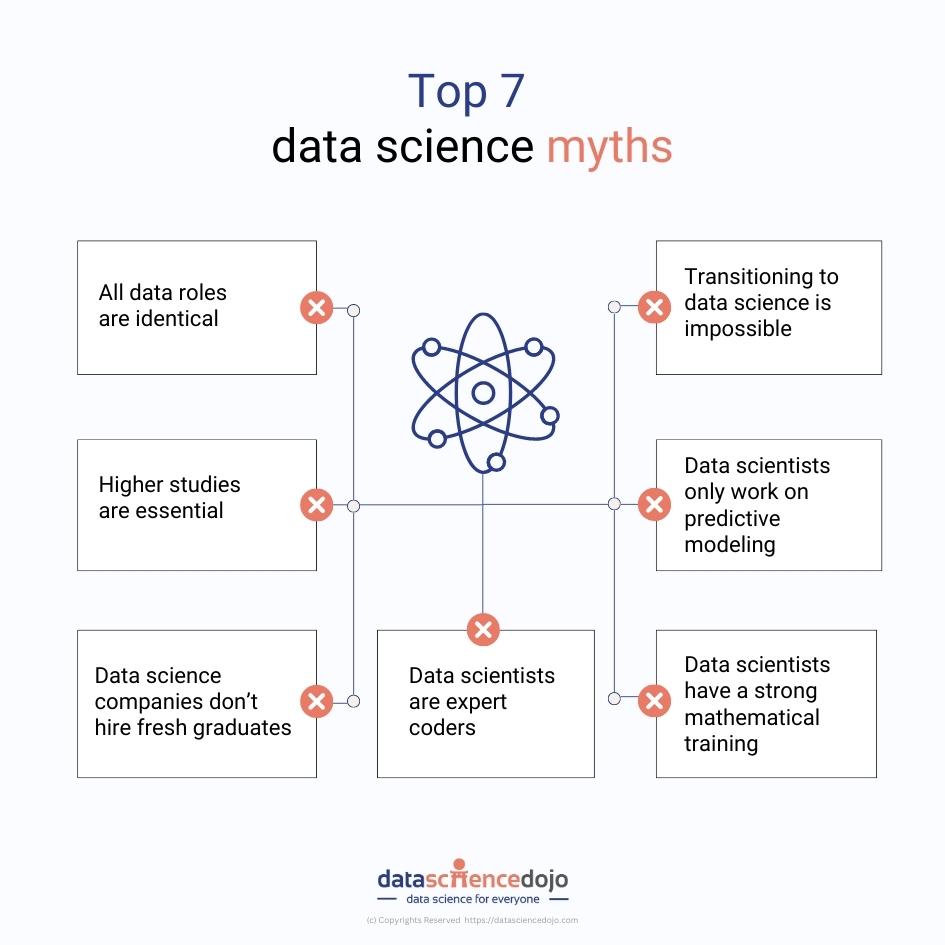Data science myths are one of the main obstacles preventing newcomers from joining the field. In this blog, we bust some of the biggest myths shrouding the field.
The US Bureau of Labor Statistics predicts that data science jobs will grow up to 36% by 2031. There’s a clear market need for the field, and its popularity only increases by the day. Despite the overwhelming interest data science has generated, there are many myths preventing new entry into the field.

Data science myths, at their heart, follow misconceptions about the field at large. So, let’s dive into unveiling these myths.
1. All data roles are identical
It’s a common data science myth that all data roles are the same. So, let’s distinguish between some common data roles: data engineer, data scientist, and data analyst. A data engineer focuses on implementing infrastructure for data acquisition and data transformation to ensure data availability for other roles.
A data analyst, however, uses data to report any observed trends and patterns. Using both the data and the analysis provided by a data engineer and a data analyst, a data scientist works on predictive modeling, distinguishing signals from noise, and deciphering causation from correlation.
Finally, these are not the only data roles. Other specialized roles, such as data architects and business analysts, also exist in the field. Hence, a variety of roles exist under the umbrella of data science, catering to a variety of individual skill sets and market needs.
2. Graduate studies are essential
Another myth preventing entry into the data science field is that you need a master’s or Ph.D. degree. This is also completely untrue.
In busting the last myth, we saw how data science is a diverse field, welcoming various backgrounds and skill sets. As such, a Ph.D. or master’s degree is only valuable for specific data science roles. For instance, higher education is useful in pursuing research in data.
However, if you’re interested in working on real-life complex data problems using data analytics methods such as deep learning, only knowledge of those methods is necessary. And so, rather than a master’s or Ph.D. degree, acquiring specific valuable skills can come in handy in kickstarting your data science career.
3. Data scientists will be replaced by artificial intelligence
As artificial intelligence advances, a common misconception arises that AI will replace all human intelligent labor. This misconception has also found its way into the field, forming one of the most popular myths that AI will replace data scientists.
This is far from the truth because. Today’s AI systems, even the most advanced ones, require human guidance to work. Moreover, the results produced by them are only useful when analyzed and interpreted in the context of real-world phenomena, which requires human input.
So, even as data science methods head towards automation, it’s data scientists who shape the research questions, devise the analytic procedures to be followed, and lastly, interpret the results.
Read about: 2023 AI and Machine Learning trends
4. Data scientists are expert coders
Being a data scientist does not translate into being an expert programmer! Programming tasks are only one component of the data science field, and these too, vary from one data science subfield to another.
For example, a business analyst would require a strong understanding of business, and familiarity with visualization tools, while minimal coding knowledge would suffice. At the same time, a machine learning engineer would require extensive knowledge of Python.
In conclusion, the extent of programming knowledge depends on where you want to work across the broad spectrum of the data field.
5. Learning a tool is enough to become a data scientist
Knowing a particular programming language, or a data visualization tool is not all you need to become a data scientist. While familiarity with tools and programming languages certainly helps, this is not the foundation of what makes a data scientist.
So, what makes a good data science profile? That, really, is a combination of various skills, both technical and non-technical. On the technical end, there are mathematical concepts, algorithms, data structures, etc. On the non-technical end, there are business skills and understandings of various stakeholders in a particular situation.
To conclude, a tool can be an excellent way to implement data skills. However, it isn’t what will teach you the foundations or the problem-solving aspect of data science.
6. Data scientists only work on predictive modeling
Another myth! Very few people would know that data scientists spend nearly 80% of their time on data cleaning and transforming before working on data modeling. In fact, bad data is the major cause of productivity levels not being up to par in data science companies. This requires significant focus on producing good quality data in the first place.
This is especially true when data scientists work on problems involving big data. These problems involve multiple steps of which data cleaning and transformations are key. Similarly, data from multiple sources and raw data can contain junk that needs to be carefully removed so that the model runs smoothly.
So, unless we find a quick-fix solution to data cleaning and transformation, it’s a total myth that data scientists only work on predictive modeling.
7. Transitioning to data science is impossible
Data science is a diverse and versatile field, welcoming a multitude of background skill sets. While technical knowledge of algorithms, probability, calculus, and machine learning can be great, non-technical knowledge such as business skills or social sciences can also be useful for a career.
Any data science myths we missed?
At its heart, data science involves complex problem solving involving multiple stakeholders. For a data-driven company, a data scientist from a purely technical background could be valuable, but so could one from a business background who can better interpret results or shape research questions.
And so, it’s a total myth that transitioning to data science from another field is impossible.

